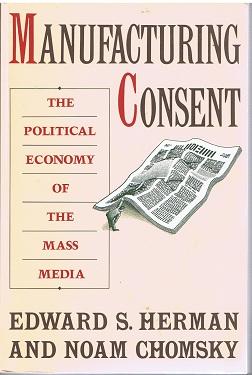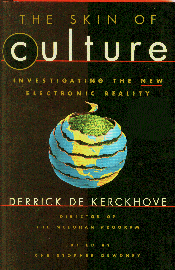Edward S. Herman, Noam Chomsky: Manufacturing Consent: The Political Economy of the Mass Media (1988/2002)
Filed under book | Tags: · mass media, political economy, politics, propaganda, war

In this pathbreaking work, now with a new introduction, Edward S. Herman and Noam Chomsky show that, contrary to the usual image of the news media as cantankerous, obstinate, and ubiquitous in their search for truth and defense of justice, in their actual practice they defend the economic, social, and political agendas of the privileged groups that dominate domestic society, the state, and the global order.
Based on a series of case studies—including the media’s dichotomous treatment of “worthy” versus “unworthy” victims, “legitimizing” and “meaningless” Third World elections, and devastating critiques of media coverage of the U.S. wars against Indochina—Herman and Chomsky draw on decades of criticism and research to propose a Propaganda Model to explain the media’s behavior and performance. Their new introduction updates the Propaganda Model and the earlier case studies, and it discusses several other applications. These include the manner in which the media covered the passage of the North American Free Trade Agreement and subsequent Mexican financial meltdown of 1994-1995, the media’s handling of the protests against the World Trade Organization, World Bank, and International Monetary Fund in 1999 and 2000, and the media’s treatment of the chemical industry and its regulation. What emerges from this work is a powerful assessment of how propagandistic the U.S. mass media are, how they systematically fail to live up to their self-image as providers of the kind of information that people need to make sense of the world, and how we can understand their function in a radically new way.
Publisher Pantheon Books, 2002
ISBN 0375714499, 9780375714498
Length 412 pages
More info (wikipedia)
More info (publisher)
More info (google books)
Derrick De Kerckhove: The Skin of Culture: Investigating the New Electronic Reality (1995/1997)
Filed under book | Tags: · cyberculture, mass media, new media, technology, television, virtual reality

This is a bold vision of the electronic media and the nature of reality in a world increasingly wired to technology. It proposes and explores concepts such as: whether democracy is outmoded and must be redesigned to reflect how technology affects power structures; whether the electronic media have extended our psychology as well as our nervous systems and our bodies; whether art must redress the balance with science and reclaim technology; and whether electronic media are reversing the effects of language, literacy and the alphabet, and whether this is a good thing.
Editor Christopher Dewdney
Publisher Kogan Page Publishers, 1997
ISBN 074942480X, 9780749424800
226 pages
PDF (no OCR; some pages missing; updated on 2012-12-5)
Comment (0)Faye D. Ginsburg, Lila Abu-Lughod, Brian Larkin (eds.): Media Worlds: Anthropology on New Terrain (2002)
Filed under book | Tags: · anthropology, ethnography, film, mass media, media, media culture, social theory, television

This groundbreaking volume showcases the exciting work emerging from the ethnography of media, a burgeoning new area in anthropology that expands both social theory and ethnographic fieldwork to examine the way media–film, television, video–are used in societies around the globe, often in places that have been off the map of conventional media studies. The contributors, key figures in this new field, cover topics ranging from indigenous media projects around the world to the unexpected effects of state control of media to the local impact of film and television as they travel transnationally. Their essays, mostly new work produced for this volume, bring provocative new theoretical perspectives grounded in cross-cultural ethnographic realities to the study of media.
Publisher University of California Press, 2002
ISBN 0520224485, 9780520224483
413 pages
More info (publisher)
More info (google books)
PDF (updated on 2012-7-14)
Comment (0)
